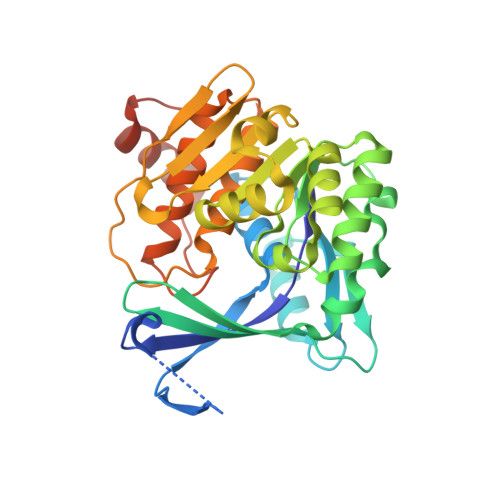Structures of Burkholderia thailandensis nucleoside kinase: implications for the catalytic mechanism and nucleoside selectivity
Yasutake, Y., Ota, H., Hino, E., Sakasegawa, S., Tamura, T.(2011) Acta Crystallogr D Biol Crystallogr 67: 945-956
- PubMed: 22101821
- DOI: https://doi.org/10.1107/S0907444911038777
- Primary Citation of Related Structures:
3B1N, 3B1O, 3B1P, 3B1Q, 3B1R - PubMed Abstract:
The nucleoside kinase (NK) from the mesophilic Gram-negative bacterium Burkholderia thailandensis (BthNK) is a member of the phosphofructokinase B (Pfk-B) family and catalyzes the Mg(2+)- and ATP-dependent phosphorylation of a broad range of nucleosides such as inosine (INO), adenosine (ADO) and mizoribine (MZR). BthNK is currently used in clinical practice to measure serum MZR levels. Here, crystal structures of BthNK in a ligand-free form and in complexes with INO, INO-ADP, MZR-ADP and AMP-Mg(2+)-AMP are described. The typical homodimeric architecture of Pfk-B enzymes was detected in three distinct conformational states: an asymmetric dimer with one subunit in an open conformation and the other in a closed conformation (the ligand-free form), a closed conformation (the binary complex with INO) and a fully closed conformation (the other ternary and quaternary complexes). The previously unreported fully closed structures suggest the possibility that Mg(2+) might directly interact with the β- and γ-phosphates of ATP to maintain neutralization of the negative charge throughout the reaction. The nucleoside-complex structures also showed that the base moiety of the bound nucleoside is partly exposed to the solvent, thereby enabling the recognition of a wide range of nucleoside bases. Gly170 is responsible for the solvent accessibility of the base moiety and is assumed to be a key residue for the broad nucleoside recognition of BthNK. Remarkably, the G170Q mutation increases the specificity of BthNK for ADO. These findings provide insight into the conformational dynamics, catalytic mechanism and nucleoside selectivity of BthNK and related enzymes.
Organizational Affiliation:
Bioproduction Research Institute, National Institute of Advanced Industrial Science and Technology (AIST), 2-17-2-1 Tsukisamu-Higashi, Sapporo 062-8517, Japan.


















